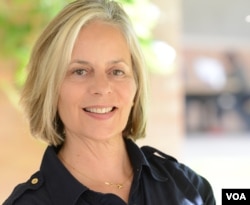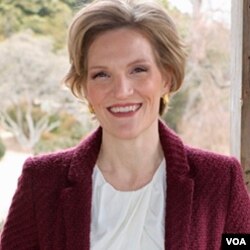Studies have shown that women do more extra, unpaid work than men, especially with housework and child care at home.
But do women professors also do more extra work than their male colleagues?
A new study published in the academic journal Research in Higher Education in April suggests yes.
The study looked at how much "service work" professors did, or extra work, like academic advising or sitting on committees to help admit students or identify new faculty members. Service work can include organizing events. External service can include representing the university through national organizations.
The study of 140 universities nationwide showed female professors do about a half-hour more service work per week than males, and 1.5 more service activities per year in 2014.
“Individuals who undertake ... roles, such as department chairs, deans, etc., are compensated for their service," the study says. "But the vast majority of faculty receive no extra compensation for other internal service activities because contributing as good citizens to the academic community is part of their job. "
Cassandra Guarino, a professor of education and public policy at the University of California-Riverside, wrote the study.
She says many of her fellow female colleagues said they were not surprised with the findings. Women often do more professionally for less in return, studies show.
It would take women in the U.S. 44 more days of work to earn the same amount as men in 2015, according to the Pew Research Group.
Guarino says many female professionals say it is harder to say no to extra responsibilities, but many women don’t realize they are asked to do more than their male counterparts.
“I don’t think women have [realized] that they may be asked to do more,” Guarino said. “And I think they just think they’re doing what everyone else is doing, when actually they are doing more of this other stuff that is taking away time from their research.”
Cynthia Miller-Idriss is a professor of education and sociology at American University in Washington, D.C. and says the difference in service work between men and women is really much greater than the study found.
Miller-Idriss, a professor since 2003, also serves as director of the international training and education program.
She says that while service work is very important to universities, schools do not value service work highly enough.
“Internal service doesn’t bring the same kinds of advantages to the university in a visible way,” Miller-Idriss said. “It can’t [operate] without it. But it doesn’t necessarily help with things like status or reputation, it doesn’t bring in additional resources. It can be much more invisible because it doesn’t draw external attention.”
Miller-Idriss notes that such heavy service workloads put female professors at a disadvantage. They have less time to work on research and publishing, which would advance their careers.
Susan Mackey-Kallis, a professor in communications at Villanova University near Philadelphiaia, said she realized that her service work was hurting her career.
She did so much service work – 20 hours a week above her teaching duties -- that she received the Lawrence C. Gallen Faculty Service Award from Villanova in 2008, which honors tenured faculty who have 10 years or more of “outstanding service” experience.
“Women [are still taught] to help, to be helpers, to [support] good organizations, good teamwork,” she said. “Men have been [taught] to, as you might say, keep their eyes on the prize,” she said.
"Uncompensated internal service is usually acknowledged and factored into annual performance reviews," the study says. "But ... generally carries less weight than research or teaching, especially in promotion and tenure reviews.”
Mackey-Kallis says there needs to be a culture change in the profession. And that professors in higher positions need to show female colleagues it is acceptable to think of themselves first sometimes.
Guarino at UC-Riverside and Miller-Idriss at American say they hope this study will bring more attention to this issue. They want faculty and administrators to think more about how much service work women are doing in comparison to men.
Please leave a comment here, and visit us on Facebook, Twitter, Instagram and LinkedIn, thanks!
But do women professors also do more extra work than their male colleagues?
A new study published in the academic journal Research in Higher Education in April suggests yes.
The study looked at how much "service work" professors did, or extra work, like academic advising or sitting on committees to help admit students or identify new faculty members. Service work can include organizing events. External service can include representing the university through national organizations.
The study of 140 universities nationwide showed female professors do about a half-hour more service work per week than males, and 1.5 more service activities per year in 2014.
“Individuals who undertake ... roles, such as department chairs, deans, etc., are compensated for their service," the study says. "But the vast majority of faculty receive no extra compensation for other internal service activities because contributing as good citizens to the academic community is part of their job. "
Cassandra Guarino, a professor of education and public policy at the University of California-Riverside, wrote the study.
She says many of her fellow female colleagues said they were not surprised with the findings. Women often do more professionally for less in return, studies show.
It would take women in the U.S. 44 more days of work to earn the same amount as men in 2015, according to the Pew Research Group.
Guarino says many female professionals say it is harder to say no to extra responsibilities, but many women don’t realize they are asked to do more than their male counterparts.
“I don’t think women have [realized] that they may be asked to do more,” Guarino said. “And I think they just think they’re doing what everyone else is doing, when actually they are doing more of this other stuff that is taking away time from their research.”
Cynthia Miller-Idriss is a professor of education and sociology at American University in Washington, D.C. and says the difference in service work between men and women is really much greater than the study found.
Miller-Idriss, a professor since 2003, also serves as director of the international training and education program.
She says that while service work is very important to universities, schools do not value service work highly enough.
“Internal service doesn’t bring the same kinds of advantages to the university in a visible way,” Miller-Idriss said. “It can’t [operate] without it. But it doesn’t necessarily help with things like status or reputation, it doesn’t bring in additional resources. It can be much more invisible because it doesn’t draw external attention.”
Miller-Idriss notes that such heavy service workloads put female professors at a disadvantage. They have less time to work on research and publishing, which would advance their careers.
Susan Mackey-Kallis, a professor in communications at Villanova University near Philadelphiaia, said she realized that her service work was hurting her career.
She did so much service work – 20 hours a week above her teaching duties -- that she received the Lawrence C. Gallen Faculty Service Award from Villanova in 2008, which honors tenured faculty who have 10 years or more of “outstanding service” experience.
“Women [are still taught] to help, to be helpers, to [support] good organizations, good teamwork,” she said. “Men have been [taught] to, as you might say, keep their eyes on the prize,” she said.
"Uncompensated internal service is usually acknowledged and factored into annual performance reviews," the study says. "But ... generally carries less weight than research or teaching, especially in promotion and tenure reviews.”
Mackey-Kallis says there needs to be a culture change in the profession. And that professors in higher positions need to show female colleagues it is acceptable to think of themselves first sometimes.
Guarino at UC-Riverside and Miller-Idriss at American say they hope this study will bring more attention to this issue. They want faculty and administrators to think more about how much service work women are doing in comparison to men.
Please leave a comment here, and visit us on Facebook, Twitter, Instagram and LinkedIn, thanks!







